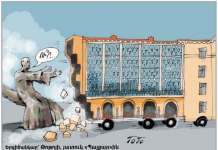Most of the time, the US media, politicians and the general public have a myopic view of world affairs outside of America’s borders. Facts and statements about Turkey’s brutal tactics domestically and its international actions leave many Americans indifferent. They feel secure and content when they hear that Turkey is our “trusted ally.” Any action or misconduct of the Turkish government is of no grave concern. The media, in its turn, feeds this disconnect, which in other parts of the world may end up costing the lives of thousands of innocent citizens.
This attitude was prevalent in the US until Turkish President Recep Tayyip Erdogan showed up in Washington this past week with his macho demeanor to trample on the constitutional rights of US citizens and export his terror tactics to American soil. The long-anticipated Erdogan trip to Washington concluded in failure with its fallout evident on the streets of this city.
The chief item on the Turkish agenda for Erdogan’s visit was the demand to stop US military support to Kurds in Syria fighting the Islamic State. Throughout the Syrian crisis, the US administration had realized that the most effective and trustworthy fighting force against the Caliphate in Raqqa was the Kurds, whereas Erdogan virtually was the godfather of the Islamic State.
Thus, the US policy to rely on the Kurds — at least at this stage of the war — ran counter to Erdogan’s policies. Despite many arm-twisting tactics, Ankara was unable to dissuade the Trump Administration. Erdogan’s trip to Washington was the last and most desperate step in that policy, which led to complete failure.
Notwithstanding the lavish mutual praise, the Trump Administration did not budge, and instead Mr. Erdogan’s anger was manifested in the streets of Washington.
Every visit that Mr. Erdogan pays to Washington turns into a spectacle. Last year, his speech at the Brookings Institute ended up in a brawl. His attempt to deliver a eulogy at Muhammad Ali’s funeral turned out to be a bitter disappointment, and he left the US unceremoniously.
This year’s visit became more lurid as his anger was channeled through his bodyguards into a fight against dissent in the land of freedom.
Many heads of state visit the US, and sometimes they are confronted with hostile demonstrations. However, they seldom abandon their dignity to engage in altercations with the demonstrators.
A veteran Turkish journalist, Cengiz Candar, writing a column in Turkey Pulse, described Erdogan’s failed visit to Washington as “the mountain gave birth to a mouse.” But the diplomatic scandal proved to be bigger than a mouse. Two demonstrations protesting his visit ended in bloody clashes. The one on May 16 in front of the Turkish ambassador’s residence concluded with nine people sent to the hospital, and triggered a barrage of accusations between American and Turkish officials.
Video clips caught Erdogan watching the melee and even ordering his secret service men to attack the peaceful demonstrators. The latter included Yezidis, Kurds and Armenians, who have been historically — and still are currently — at the receiving end of Turkish brutality.
As long as Erdogan remained on his sultan’s throne in Ankara, his actions were of little concern, but once he revealed his true face on American soil, members of the House and Senate and even State Department officials could not remain silent.
The most undiplomatic reaction came from Sen. John McCain (R-Ariz.), who proclaimed: “This is the United States of America. We do not do this here. There is no excuse for this kind of thuggish behavior.” He also called for the expulsion of the Turkish ambassador.
Incidentally, the legislature in Texas this week passed a resolution recognizing the Armenian Genocide. Most probably as a rebuke to Erdogan’s arrogance.
Realizing that there was no room left for diplomatic niceties, the State Department also threw down the gauntlet. In its statement, it condemned the attack as an assault on free speech, and warned Turkey that this action would not be tolerated. “We are communicating our concern to the Turkish government in the strongest possible terms,” said Heather Nauert, State Department spokeswoman.
House Foreign Affairs Committee Chairman Edward R. Roy (R-Calif.) said, “agents of foreign governments should never be immune from prosecution for felonious behavior.” In a letter to Attorney General Jeff Sessions, he urged a quick inquiry and filing “appropriate charges” before the security officers leave the country.
In its turn, the Erdogan government blamed the US for not providing “appropriate security,” and again resorted to cheap shots, characterizing the protestors as PKK sympathizers. Ankara also summoned the US ambassador to lodge its protest.
Contrary to his usual practice of shooting from the hip, President Donald Trump maintained complete silence, perhaps believing that the fight has been relegated to the State Department.
But the Boston Globe did not find that unusual silence justifiable and in an editorial column titled “Trump’s Shameful Silence on Turkish Protest,” the paper blasted the president. It declared, “President Trump has nothing to say after Turkish security guards violently attacked protestors, who were peacefully demonstrating in Washington. That’s reprehensible — but not a surprise, given Trump’s personal contempt for First Amendment rights.”
Although Erdogan’s visit did not yield much for his country, his true face brought home the message about Erdogan’s domestic policies, which oppress millions of people in Turkey. As if that were not enough, he also attempted to impose his dictatorial rule over US citizens.
This visit provided a true lesson for American politicians and the media by forcing them to directly deal with the consequences of Erdogan’s brutality. It also is a lesson for American citizens, whose indifference silently condones the violence to millions of innocent people committed by governments that are supported by the US. By Edmond Y. Azadian














